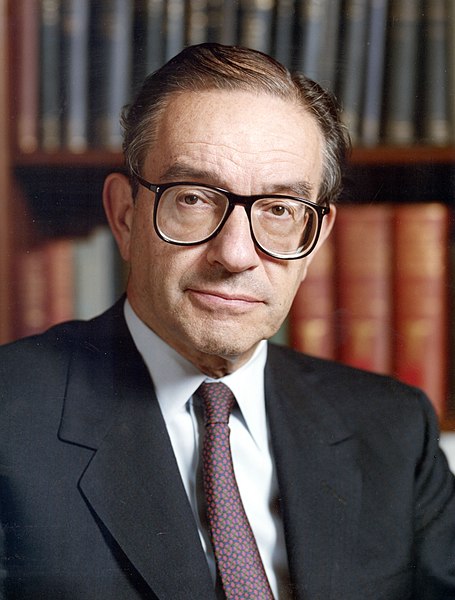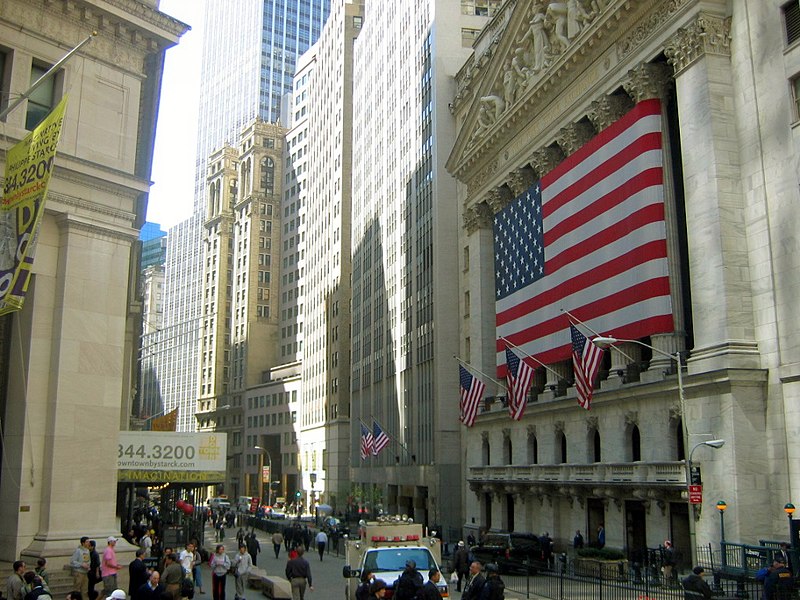It's all Ayn Rand's fault.
Curtis's latest series is All Watched Over By Machines of Loving Grace, a fabulous title borrowed from Richard Brautigan's 1967 poetry collection, in which the title poem describes a world where cybernetic machines have removed the need for human labour. Here, Curtis addresses the financial model adopted by the West since the fall of Communism; how deregulation became the norm; and how machines were treated as the holders of the answers that, in spite of the financial crash, those running the Western superpowers still hold as true. He places the blame squarely at the feet of California-based Silicon Valley individualists, and Ayn Rand advocates. When Alan Greenspan, the head of the US Federal Reserve from 1987 to 2006, and briefly the most powerful man on the planet, is one, it becomes a facinating proposition.
Curtis's style is cut-up, transposive, inter-textual. He uses archive footage occasionally incongruously, but it works brilliantly. Curtis never appears, but his polemic is present throughout. He holds a conversation with the audience, through both his voice-over and on-screen text. His argument flows, clashing grand ideas together with such verve and insight that you can't help but be swept along.
Power hasn't gone away, Curtis argues. It never does.
The apparent freedom of the internet, in which ever individual can have a voice, is a selfish place. This is not an accident. The designers in California who helped develop the internet were influence heavily by the Russio-American novelist Ayn Rand, whose novels, The Fountainhead and Atlas Shrugged, were a gospel of the virtue of individual selfishness. All you need, Rand argued, is yourself, free from any state interference. If selfishness is adopted by all, then everything else will sort itself out. The Silicon Valley engineers believed that through the internet, this was possible. It would be a new collective of humanity, entirely outside of the traditional bounds of states and politics. It would be, simply, people.
Rand's philosophy was also heavily influential on Alan Greenspan, who first met her in the 1950s. He was a member of the Ayn Rand Collective, a group who formed Rand's only friends, and to whom she read Altas Shrugged as it was being written. Greenspan and his generation of American economists believed that Rand's philosophy could apply to the financial markets, particularly after computer simulations had reached a point at which they could model the risk of financial transactions. They first were able to practically apply this philosophy under Bill Clinton's presidency. They convinced Clinton that the budget deficit meant that the only sensible course was tax cuts, and deregulation of financial markets, which - as they could now simulate risk - would never fail. The economic growth it generated would never cease, as the markets would cease making bad investments - computer modelling would see to that.
And you know what? It briefly worked. The Labour Chancellor Gordon Brown, also a believer in deregulation after seeing its success in generating growth in America, put it very clearly to the British parliament. There will be no return to boom and bust. Everything looked just fine, and the economic growth of the decade from 1995-2005 was unprecedented in its continuance. But it made the subsequent crash all the more painful, and all the more unexpected by the people running the economies of the western powers. They thought they'd stopped this kind of thing from ever happening again. They hadn't.
Prior to the crash, the International Monetary Fund, also advocates of deregulation, behaved appallingly to South East Asia, which they used as a testing zone for their ideas. The banks collapsed in South Korea and Indonesia in the late 1990s, and in return for bailing them out (as the governments had guarenteed the banks and could not afford their populations to lose their savings), the IMF demanded that they deregulate further. Strangely, after an initial recovery after the bailout, once the American investors in the South East Asian banks had been paid off, the economies crashed again. And this time there was no one there to help pick up the pieces. The taxpayers of South East Asia were screwed. Clinton took his eye off the ball due to the Monica Lewinsky scandal, and didn't act to affect US policy in this area at all. In essense, US foreign policy in this area was being run by the Randian Treasury department. They did not believe that anything could be wrong with their models, their predictions. They ordered more deregulation.
Yet when the 2007-8 global financial crash happened, and the governments of the western world bailed out the banks, and that money again merely went to satisfy the investors, leaving the tax payers with the ultimate bill, they still didn't get the message. Greenspan was still at the helm, and he held his world of deregulated financial markets together with every ounce of determination he had. And that leaves us where we are today, with massive spending cuts across Europe and America, yet the bankers involved in the financial crash are able to take home record bonuses. There is no regulation to stop them.
It is China that didn't buy the deregulation argument. One of the fundamental reasons why they have become the second largest economy on the planet and will soon be the first, is that they fixed their exchange rate. This allowed them to trade with the US on massively favourable terms, and to generate enormous revenue through dealing with foreign countries, without weakening their own position. The volatility inherent in deregulated financial markets that Greenspan and others believed had been removed by computers means that after the financial crash the US is in no position to respond. The machines have let their owners down.
It is a compelling argument, presented in a fast-cutting, polemical way, with Curtis's voice of quiet authority holding an air of a wise professor explaining to his audience how the world actually works. It is engrossing, intelligent, brilliantly-presented television. Don't miss it.







No comments:
Post a Comment